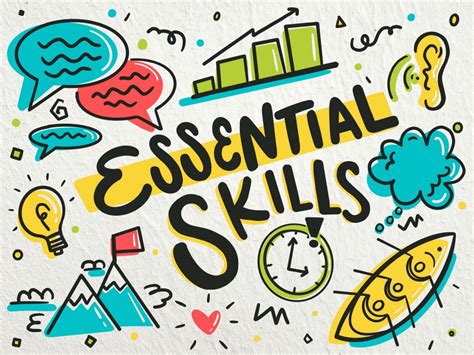In today's rapidly evolving professional landscape, it is essential to continuously strive for personal growth and professional development. We all have aspirations to progress and acknowledge the significance of acquiring a higher position within our respective organizations. The journey towards achieving your goals may seem daunting, but it is not impossible. By exploring various avenues and leveraging your unique skill set, you can enhance your chances of securing a well-deserved promotion.
Empowerment is the key to unlocking opportunities for advancement. By taking charge of your own professional growth, you demonstrate a proactive approach towards your career. This entails actively seeking out innovative strategies, constructive feedback, and additional responsibilities that collectively contribute to your skill set. Employers are drawn to individuals who possess self-drive and a commitment to self-improvement, which are essential qualities for aspiring future leaders.
Cultivating strong relationships within your organization is another crucial factor in achieving a promotion. Building a network of supportive colleagues and mentors helps create a solid foundation for personal and professional growth. These connections offer opportunities for collaborations, knowledge sharing, and access to valuable advice. Additionally, establishing trust and credibility contributes to an environment where opportunities for advancement are more likely to arise.
Developing Essential Skills for Advancement

In order to progress and reach your desired position within your career, it's important to focus on developing key skills that are crucial for advancement. By honing these essential skills, you can increase your chances of success and position yourself as a strong candidate for promotion.
- 1. Effective Communication: The ability to communicate clearly and concisely is a valuable skill that can positively impact your professional growth. Develop your communication skills by actively listening, expressing ideas confidently, and adapting your communication style to different audiences.
- 2. Leadership and Collaboration: Demonstrating leadership qualities and the ability to work well with others is essential for career advancement. Cultivate your leadership skills by taking on challenging projects, fostering teamwork, and inspiring others to achieve common goals.
- 3. Problem-Solving and Critical Thinking: Employers value individuals who can think critically and find innovative solutions to complex problems. Enhance your problem-solving skills by seeking out opportunities to solve challenging issues and embracing a proactive approach to decision-making.
- 4. Adaptability and Flexibility: In a constantly evolving work environment, the ability to adapt and thrive in change is crucial. Show your adaptability by being open to new ideas, embracing change, and seeking continuous learning and improvement.
- 5. Time Management and Organization: Being able to effectively manage your time and prioritize tasks is essential for success. Develop strong organizational skills by utilizing tools such as calendars and task lists, setting clear goals, and efficiently allocating your time and resources.
- 6. Emotional Intelligence: Developing emotional intelligence enables you to understand and manage your emotions, as well as effectively navigate social dynamics within the workplace. Enhance your emotional intelligence by practicing self-awareness, empathy, and fostering positive relationships with colleagues.
By focusing on these essential skills, you can enhance your professional capabilities and position yourself for advancement within your career. Remember, growth and development are continuous processes, so strive to consistently improve and refine these skills to achieve your goals.
Standing Out as a Leader in the Workplace
In today's competitive professional landscape, it is crucial to distinguish oneself as a standout leader in order to propel your career forward. By cultivating a strong presence and demonstrating exceptional qualities and skills, you can position yourself as a leader in your workplace and increase your chances of success in achieving your career goals.
A true leader possesses a unique set of attributes that sets them apart from their peers. First and foremost, effective communication is essential. Being able to articulate ideas clearly and concisely, actively listen to others, and adapt communication styles to different situations helps establish trust and fosters strong relationships with colleagues and superiors.
In addition to communication skills, displaying confidence and self-assurance can make a significant impact. Remaining calm under pressure, taking initiative, and handling challenges with poise and resilience not only garners respect but also inspires others to follow your lead. Furthermore, exhibiting a genuine passion for your work and an unwavering commitment to excellence can be infectious, motivating others to strive for greatness as well.
While individual accomplishments are important, a true leader also recognizes the value of teamwork and collaboration. Encouraging a culture of inclusivity, actively seeking diverse perspectives, and fostering a supportive environment that celebrates the successes of others are all instrumental in building strong teams and fostering a positive and productive work atmosphere.
Moreover, continuous learning and personal development are integral to standing out as a leader. Embracing new opportunities for growth, seeking feedback and constructive criticism, and continuously expanding your knowledge and skills demonstrate a commitment to self-improvement and professional advancement.
In conclusion, by embodying the qualities of effective communication, confidence, passion, teamwork, and continuous learning, you can distinguish yourself as a leader in the workplace. Remember, true leadership comes from within and is not simply determined by your job title or position in the hierarchy. It is about inspiring others, driving positive change, and consistently delivering exceptional results.
Strategically Navigating Office Politics

Building effective relationships within your workplace environment can play a vital role in advancing your career ambitions. Understanding the dynamics of office politics and skillfully maneuvering through them can be the key to achieving success and positioning yourself for a potential promotion.
Mastering the art of navigating office politics involves a combination of emotional intelligence, clarity in communication, and the ability to build alliances. By developing a nuanced understanding of the power dynamics at play, you can identify influential individuals, anticipate potential challenges, and uncover opportunities for growth.
One essential aspect of navigating office politics is maintaining a professional image while building authentic connections with colleagues and superiors. Fostering genuine relationships based on mutual respect and trust can create a supportive network that will help you navigate challenging situations and make your accomplishments more visible.
Conflict resolution skills also play a significant role in navigating office politics successfully. By approaching conflicts with diplomacy, empathy, and a focus on finding win-win solutions, you can establish yourself as a problem solver and a valuable asset to your team.
Furthermore, staying informed about organizational dynamics and staying up-to-date with industry trends can enhance your ability to contribute meaningfully to discussions and decision-making processes. Actively participating in relevant projects and initiatives can also help you build a strong reputation and demonstrate your leadership skills.
Remember, navigating office politics is not about manipulation or playing games; it's about leveraging your strengths, building relationships, and creating a positive work environment that supports your professional growth. By strategically navigating office politics, you can position yourself as a capable and respected individual, increasing your chances of securing that coveted promotion.
FAQ
How can I increase my chances of getting a promotion at work?
To increase your chances of getting a promotion at work, you can start by setting clear goals and objectives that align with the company's vision. Additionally, you should strive to constantly improve your skills and knowledge through training and professional development. It's also important to build strong relationships with your colleagues and supervisors, and actively seek out opportunities to take on additional responsibilities or lead projects. Finally, make sure to showcase your achievements and contributions to the company during performance evaluations or when discussing career advancement with your superiors.
Is it necessary to communicate my career goals to my supervisor?
Yes, it is important to communicate your career goals to your supervisor. By sharing your aspirations and ambitions, you allow your supervisor to better understand your career objectives and can receive guidance and support on how to achieve them. Additionally, discussing your goals with your supervisor can demonstrate your dedication and commitment to your job, and they may consider you for more challenging assignments or opportunities for advancement.
How can I prove my readiness for a promotion?
To prove your readiness for a promotion, you can take several steps. Firstly, consistently perform at a high level in your current role and exceed expectations. Show initiative by taking on additional responsibilities and demonstrating leadership skills. Additionally, you can seek feedback from your supervisor and colleagues to understand areas of improvement and actively work on them. It's also important to showcase your achievements and the impact you have made on the organization. Finally, demonstrate your continuous learning and growth by attending training programs or obtaining relevant certifications.
What should I do if I keep getting passed over for promotions?
If you repeatedly get passed over for promotions, it's crucial to assess the situation and take appropriate action. Start by having an open and honest conversation with your supervisor to gain insights into why you weren't selected for the promotion and what you can do differently in the future. Listen to the feedback and actively work on improving any identified areas for development. It's also important to stay proactive, seeking out new learning opportunities and taking on additional responsibilities to showcase your skills and dedication. If there are limited growth opportunities in your current organization, consider exploring external opportunities that align with your career goals.
How long does it typically take to get a promotion at work?
The time it takes to get a promotion at work can vary depending on various factors, including the company's policies, your performance, and the availability of higher-level positions. There is no set duration for receiving a promotion, as it largely depends on individual circumstances. However, on average, it could take anywhere from a few months to a few years to secure a promotion. It's important to stay motivated, dedicated, and consistently demonstrate your abilities and potential for growth to increase your chances of getting promoted in a timely manner.



